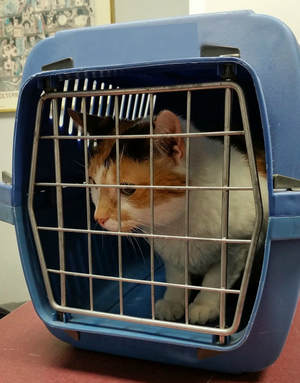Natural Disasters are unpredictable--you can never be entirely sure what will happen. If you evacuate, you may not know where you will end up, or for how long you will be away from home. Of course, it goes without saying that, if it's not safe for you, it's not safe for your companion animals; if you evacuate, take all family members with you. It is best to have an evacuation plan in place in advance, just in case a disaster strikes. If you do need to evacuate, here are some things you should bring with you to help keep your animals as safe and comfortable as possible:
1. Food and water to last for seven days.
2. Medications to last for one month.
3. Sturdy, escape-proof carriers and leashes. Bring a collapsable, pop-up kennel too, if possible.
4. Copies of all medical records, including vaccination* records.
5. Written information containing specific instructions* regarding your animals' specific care needs, with special attention to medication regimens.
6. Identification--be sure that your microchip contact info in the microchip database and the info on your animals' collar tags is up to date.
7. Pictures of your animals, and, if possible, pictures of you with them (if you are separated, these can help prove that they are your family members).
8. For cats, a makeshift litter box (small cardboard trays from cases of canned cat food work well).
9. For cats, litter to last seven days.
10. Small bags to dispose of waste and soiled litter.
11. A favorite blanket and favorite toys. Bring a favorite bed, if possible.
12. First aid kit (speak to your vet about what to include, and never administer medication to your animals without a vet's approval).
Additionally, please fill your gas tank, and keep enough cash on your person to last for several days. After a disaster, there may be power outages that cause a failure of gas pumps, ATMS, and/or credit/debit card merchant kiosks.
When you return home there may be dangerous debris scattered about, both inside and outside your home. There could also be downed power lines, and standing water that is unsanitary due to sewage, chemical, or other contamination. The environment may smell and look different, which can be frightening to animals. Do a thorough inspection of the inside of your home prior to allowing your animals to roam the house. And, even if you normally let your animals roam free outside (which we DO NOT recommend), please keep them indoors, or take them outside only on a leash under your very careful supervision.
* Keep your animal's vaccination records up to date--if you find yourselves in a shelter, or need to board your animals, you may be required to show proof of vaccination. And, if your animals need to be boarded, specific information about your animals' care requirements will be invaluable to their caretakers.
1. Food and water to last for seven days.
2. Medications to last for one month.
3. Sturdy, escape-proof carriers and leashes. Bring a collapsable, pop-up kennel too, if possible.
4. Copies of all medical records, including vaccination* records.
5. Written information containing specific instructions* regarding your animals' specific care needs, with special attention to medication regimens.
6. Identification--be sure that your microchip contact info in the microchip database and the info on your animals' collar tags is up to date.
7. Pictures of your animals, and, if possible, pictures of you with them (if you are separated, these can help prove that they are your family members).
8. For cats, a makeshift litter box (small cardboard trays from cases of canned cat food work well).
9. For cats, litter to last seven days.
10. Small bags to dispose of waste and soiled litter.
11. A favorite blanket and favorite toys. Bring a favorite bed, if possible.
12. First aid kit (speak to your vet about what to include, and never administer medication to your animals without a vet's approval).
Additionally, please fill your gas tank, and keep enough cash on your person to last for several days. After a disaster, there may be power outages that cause a failure of gas pumps, ATMS, and/or credit/debit card merchant kiosks.
When you return home there may be dangerous debris scattered about, both inside and outside your home. There could also be downed power lines, and standing water that is unsanitary due to sewage, chemical, or other contamination. The environment may smell and look different, which can be frightening to animals. Do a thorough inspection of the inside of your home prior to allowing your animals to roam the house. And, even if you normally let your animals roam free outside (which we DO NOT recommend), please keep them indoors, or take them outside only on a leash under your very careful supervision.
* Keep your animal's vaccination records up to date--if you find yourselves in a shelter, or need to board your animals, you may be required to show proof of vaccination. And, if your animals need to be boarded, specific information about your animals' care requirements will be invaluable to their caretakers.

.
Want to be a hero?
Please help give cats a healthier future.
Support Feline CKD research.
Want to be a hero?
Please help give cats a healthier future.
Support Feline CKD research.
We care passionately about animal welfare issues, and about feline kidney disease in particular, but please understand that we are not veterinarians, and are not qualified to provide veterinary medical advice. If you have a companion animal suffering from kidney disease it is imperative that you consult with a licensed veterinarian, who is qualified to provide you with medical advice and care that meets your animal’s particular health needs.
Copyright © Foundation for Feline Renal Research, 2013-2017. All Rights Reserved. No part of this website may be reproduced without the express written consent of Foundation for Feline Renal Research, Ltd.
Copyright © Foundation for Feline Renal Research, 2013-2017. All Rights Reserved. No part of this website may be reproduced without the express written consent of Foundation for Feline Renal Research, Ltd.


 RSS Feed
RSS Feed


